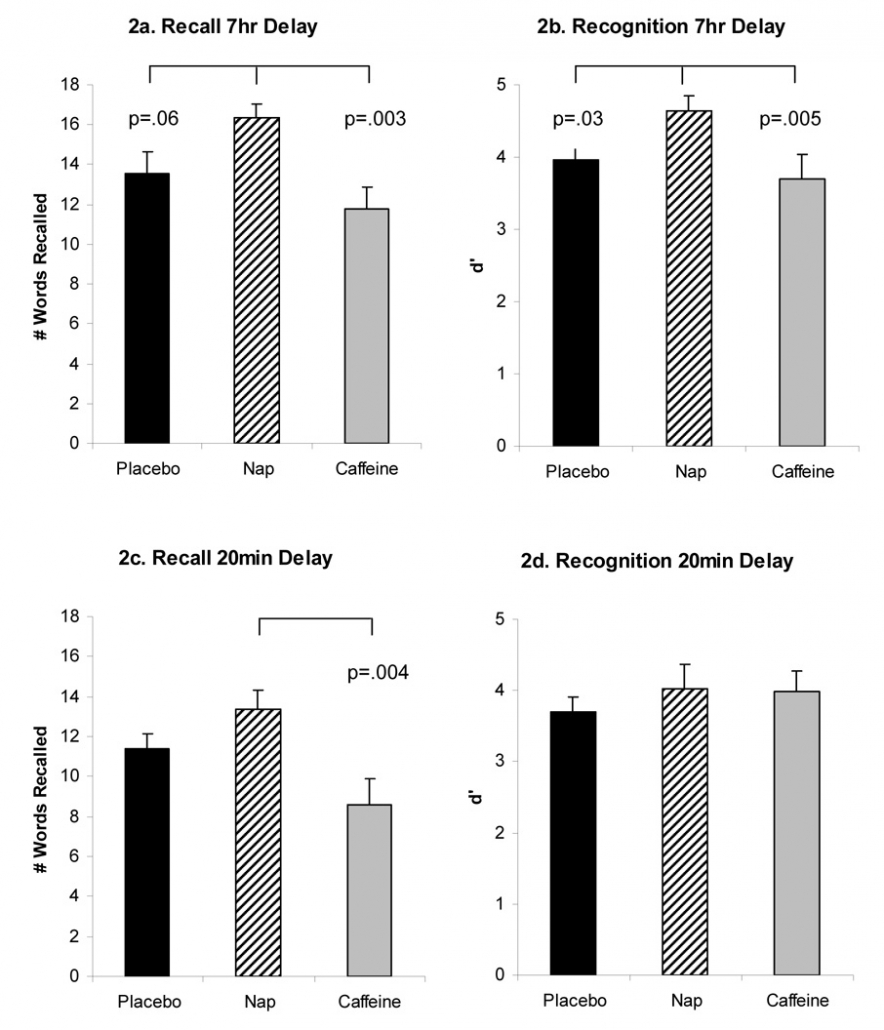We include products in articles we think are useful for our readers. If you buy products or services through links on our website, we may earn a small commission.
Benefits of Napping: Health, Creativity, Performance

The benefits of napping come from aligning our behavior with the way our energy levels follow natural cycles throughout the day. These cycles are determined by a combination of our circadian rhythm (the clock inside our heads), the quality of our sleep, our genetics, and age.
Yet almost everyone experiences a mid-day slump when you have the urge to take a nap. Though most of us have become accustomed to powering through these dips with the help of caffeine or sheer willpower, there are numerous health benefits of giving into the urge, and napping.
Let’s explore.
The Many Health Benefits of Napping
Napping is a great way to limit the effects of everyday stress and refresh the mind and body. Short naps during the day enhance creativity, increase productivity, boost memory, and help your mind and body relax.
1. Improves Memory
We know that sleep plays a critical role in storing memories in our brain [1][2]. Short naps are a way to enhance the memory consolidating power of sleep.
To explore how napping benefits memory a 2019 study, divided undergrad students into different groups. Each group spent 90 minutes learning about crabs.
One group then napped for an hour. A second group spent an additional hour “cramming” information about crabs. And a third group watched a 1 hour move on crabs. Afterward all three groups spent another 90 minutes learning about crabs in a class.
Then they all took a 30-minute break, after which they took a test on what they learned, and then another test one week later.
On the first test the “nap” group and the “cram” group performed better. And on the last test the nap group outperformed everyone.
The takeaway from the test is that napping helps consolidate information into long-term memory [3].
Various other studies have found that napping helps us differentiate between different stimuli, and improves our ability to recall specific experiences and events [4].
2. Improves Cognitive Function
Naps reduce drowsiness and enhance cognitive performance. Regular naps at the same time every day are associated with improved mental agility.
Sleeping during the afternoon between 1 p.m. to 3 p.m. can increase verbal fluency, locational awareness, and working memory.
Sleep deprivation and insomnia are becoming a global concern, as lack of sleep disrupts immune function and increases stress hormones like norepinephrine and cortisol in the body that affect cognition.
In a large-scale 2020 study on adults over 60, those who napped scored significantly better on tests screening for dementia [5].
The lead study authors commented, “Napping helps your brain recover from burnout or overload of information. While taking naps, your brain clears out unnecessary information out of your brain’s temporary storage areas to prepare it for the new information to be absorbed.”
3. Improves Performance on the Job
Benefits of napping include a boost in productivity and concentration, both of which improve work performance. Napping can also reduce depression and anxiety by controlling the cortisol levels in the blood.
If your job requires performing complex tasks, consider taking short nap breaks to boost your energy levels.
In a study on napping and productivity among the urban poor, researchers from MIT found that “ short afternoon naps at the workplace improved an overall index of outcomes by 0.12 standard deviations, with significant increases in productivity, psychological well-being, and cognition, but a decrease in work time.” Interestingly, participants also invested more of their money into savings accounts, suggesting that napping also promotes delaying gratification for future gain [6].
4. Improves Mood
Are you feeling down? Try a power nap. It is common for people across the globe to sleep away their stress.
Numerous studies have found that napping for 30-60 minutes can lift your spirits and improve your mood [7].
Other studies have shown that dipping into REM sleep can help regulate emotions [8]
5. Increases Alertness
Studies looking of shift workers have found that people who work at odd hours or during the night can nap for 30-60 minutes to improve alertness and performance [8]. Naps improve both daytime and nighttime alertness levels.
When working on long and complex tasks, we tend to reach out for a cup of coffee to thwart sleep. Various sleep studies have proven that naps show long-lasting improvements in mood, alertness, and performance compared to caffeine.
Researchers comparing naps vs. caffeine found that “Overall, a daytime nap generally improved performance across three different learning paradigms, while caffeine impaired (or at least did not benefit) performance” [9].
6. Reduces Stress
Several studies confirm that naps improve reaction speed, minimize stress, and increase energy in the body. By inducing relaxation, naps regulate mood and the ability to deal with everyday life situations.
Napping also enhances cognitive and problem-solving performance, which further increases your capacity to combat stress. Experts claim that a 30-minute nap can significantly reduce stress and prevent panic attacks.
7. Supports Heart Health
The health benefits of naps include maintaining blood pressure and blood sugar levels. By regulating mood and stress, naps allow your body to relax. Naps can prevent heart problems because they decrease blood pressure levels significantly.
Hypertension is one of the most common causes of cardiovascular problems. People who nap regularly are 48% less likely to experience a stroke, heart failure, heart attack, or other heart problems [10].
8. Increases Creativity
If you are looking to increase your level of creativity, try taking naps regularly.
Research has found that napping boosts creativity by fostering the formation of connections between related items, promoting the utilization of embedded rules and lists associated with learned material, and facilitating the integration of new and old information. [11][12][13].
Benefits of Naps vs. Caffeine
Most studies about caffeine focus on wakefulness and attention. While these indicators are essential when it comes to road safety and workplace attention, studies overlook caffeine’s effects on cognitive performance.
Cognitive processes require learning and memory formation, and this is where napping wins. People who take frequent naps perform better at various motor learning and memory tasks than those who drink caffeine to stay awake. [14]
So, while coffee is a good alternative if you cannot nap during the day, it may not provide you the boost in productivity and creativity that a power nap can.
However, combining caffeine and a nap can enhance wakefulness while also providing the cognitive benefits of sleep.

Source: Behav Brain Res. Author manuscript; available in PMC 2009 Nov 3.
How to Get the Health Benefits of Naps?
Napping is an art and a science. To fully yield the benefits of naps, it is important to understand the difference between slow-wave sleep and deep phase sleep. =
Length of Naps
We move through multiple stages of sleep every time we fall asleep. According to research, a five-minute micro naps may be insufficient, a power nap of 15-30 minutes is beneficial whereas waking up from a deep sleep phase of up to 60 minutes can cause sleep inertia. [15]
If you take longer naps, you risk falling into a deep sleep, which can lead to frustration and drowsiness after waking up.
Frequency of Naps
Frequency and timing are essential components of healthy napping. If you want to incorporate napping into your everyday life, schedule it at the same time every day.
Making napping a habit allows your body clock to sync with the routine, helping you automatically enter a relaxing phase, and making it easier to fall asleep. [16]
The Best Time to Nap
A key to successful napping is practicing it at the right time, as napping at the wrong time can leave you feeling groggy and restless. A poorly timed napping schedule also reduces the benefits of naps and impacts your natural sleep cycle.
According to the natural sleep rhythm of our bodies, the best time to nap is between 1 p.m. to 3 p.m.
Afternoon naps are more beneficial and restful than sleeping for longer periods at any other time of the day. This is because our body is programmed to wake up in the day and enter the resting phase at night.
Biologically, our body is designed to experience two types of peak times in which we are most likely to sleep. The first peak occurs after sunset, and the second one occurs 12 hours after waking up or during mid-day. [5]
The ideal nap time is the post-lunch dip called the “nap zone.” It is common to experience fatigue after lunch, so scientifically, this is the best time to snooze for 15 to 30 minutes. Napping right before or right after lunch can improve concentration, alertness, and memory.
The Health Benefits of Naps: The Takeaway
Napping has been shown to benefit memory, cognitive function, job performance, mood, heart health, and creativity while reducing stress.
Napping has also been shown to be superior to caffeine when it comes to learning, memory consolidation, and cognitive performance. While combining coffee and napping can enhance the benefits of napping with the alertness of caffeine.
The key to developing a healthy nap routine is to make a schedule where you nap during the same time each day within the “nap window”. For most people, this is between 1-3 pm.














